
After being sold by her own father, Anong, a 15-year-old girl from Muang Fuang in Laos, came to realise that her home wasn't the protective, caring place she thought it was.
She had grown up a humble country girl in the mountainous area of Ban Pak Huay, 140km north of the capital Vientiane, with her father, two brothers and an aunt.
Since last year, at least 10 Lao girls from Ban Pak Huay and eight from surrounding areas were taken away by local agents from a "matchmaking agency" who claimed they could marry the young women to wealthy Chinese mainlanders.
Due to her youth, good looks and the fact she was a virgin, Anong was approached by the matchmakers late last year. But she wasn't interested.
Even though Anong had made up her mind, the final decision was not hers to make. Her father, Bea, a poor farmer who owns a medium-sized potato farm, needed the money and accepted the deal.
Earlier this year, when the same agent returned to the village, Mr Bea told her that his daughter was ready to be a bride.
The agent paid him 2.5 million kip (11,000 baht or $310) up front. It may not sound like a lot of money, but to him it meant he could plant a new crop and have savings left over.
"It's her duty," Mr Bea said firmly when interviewed at home. "She is a daughter and that's what she is supposed to do -- work and bring home money. Moreover, she will have a better future married to a foreign man."
Sold against her wishes, Anong saw no other option but to follow her father's orders. Dejected as she was, Anong's nightmare was only beginning.
BENDING THE RULES
At first, Anong was encouraged by the prospect that her unknown fiance appeared to be a good catch.
"She [the agent] showed me a picture of the man who I was going to marry," Anong told Spectrum in Vientiane recently. "He was good-looking and still young. She told me he was only 27 and very wealthy."
After the deal was struck, the agent organised Anong's travel documents, which included a passport and visa to China. However, the Lao government doesn't allow anyone aged below 18 to travel out of the country without their parents. But the agent managed to bribe local officials to change her birth details to make her eligible to travel.
Anong's birth year was doctored from 2001 to 1998 by simply changing her birth certificate with a pen and initialling it. In August, Anong was taken to Boten in Laos' Luang Namtha province which borders China.
But when she arrived at immigration, the Chinese officials checked her travel documents against her appearance. They questioned how old she really was as she looks much younger than 18. Anong was denied entry to China. The agent was in a quandary as non-delivery of the young bride meant she would have to pay back the 2.5 million kip to the Chinese buyer in Yunnan province.
PAYING OFF THE 'DEBT'
Boten was once a bustling casino town that boasted 10,000 residents servicing the Chinese gamblers flocking to the city, located in a special economic zone.
But five years ago, Beijing ordered the casinos, many run by Chinese concessionaires, to close after reports of gamblers being locked up for unpaid debts and concerns it was laundering dirty money. Border controls were tightened and power supplies to the city were restricted or cut off.
Nowadays, Boten is a virtual ghost town with the glitzy buildings standing unused and the population dwindling to about 500 people.
But in neighbouring Bokeo province, just across the Mekong from Chiang Rai, another sprawling casino complex catering to the Chinese has sprung up.
The agent, who needed to recoup 2.5 million kip, had an idea about how to get her money back. She took Anong to the casino and asked her to wait in the lobby while she went to meet a friend inside.
"I was waiting there as she said she would take me home after she talked to her friend. Then she walked out with a Chinese man," Anong recalled.
Anong was unaware that the agent had made a secret deal to sell the teenager's virginity to him for 1.5 million kip, or about $185.
Anong went with the man to the casino hotel room after which he returned her to the casino lobby where the agent was waiting. She was then taken by van to Vientiane where the agent wanted to put her to work to pay back the money.
Along the way, the van picked up another elderly agent and a 16-year-old girl, Joy, who had been through a similar situation to Anong. The elderly agent was called to another job and dropped the girls just outside Vientiane with a warning that they were being watched by a network of people. They were told to find work and warned they would be under strict surveillance until they worked off their "debts".
LUCKY ESCAPE
But luckily after wandering around town for only a few hours, they were approached by a local NGO staff member working in human trafficking who asked if they were OK.
Anong said after they were rescued, they told their full stories to the foundation staff. They were then taken to a local hospital for health checks. Anong was lucky as she hadn't caught any diseases from the first man she slept with, but Joy had contracted syphilis.
After looking after them for a week, the foundation sent the teenagers to the police to file complaints. They are now living in a government shelter and will stay there until they work out what to do with their lives.
Both are traumatised by their experiences and have told police they don't want to return to their homes.
"I don't want to go home," Anong told Spectrum tearfully.
"I know my father will be disappointed in me and he will try to find a way to send me away again. I don't want to go through that any more."
Anong is a farmer's daughter, and as such does not have the privileges males enjoy in Lao society. Her family didn't have money to send her to school and she was put to worker at her father's potato farm from the age of 12. He kept on telling her the main duty of a good daughter was to help support the family.
Her two brothers do not have to work as hard and have fewer obligations to support the family.
Anong's father doesn't believe he did anything wrong in selling his daughter via what he believes is a matchmaking agency.
The NGO, which does not want to be named, has since contacted Mr Bea, but did not tell him of his daughter's traumatic experience as she requested not to have contact with him.
As far as Mr Bea is concerned, she is living >> >> happily in China with her new husband and hopes she will return during the New Year holidays with gifts.
"Many people in my village are doing this," he said. "I think of how that money will help my situation and how my daughter is going to have a lot better future than working here. Marrying a foreigner is like every parent's dream come true. So I agreed to the deal."
MISMATCHED MARRIAGES
Nam, a 26-year-old Lao woman from Sainyabuli province, came to Vientiane looking for work. Like many migrants, she wanted to make more money in the big city.
But her ultimate dream was to marry a good man. Ideally, she would marry a foreign husband, which would almost guarantee her a better future.
Four months ago, her friend told her about a good matchmaking service. Unlike many other options she'd heard of, this service didn't do forced marriages.
The service sends a picture of a man to the prospective bride. If she is satisfied, they can sign the contract and meet.
"I have been single for so long and I am not getting any younger," said Ms Nam. "That's why I decided to go there and leave my profile in the hope that I could find my future husband there."
Ms Nam went to the recommended matchmaking service office. It was located in a large shopping mall in Vientiane, where Chinese businessmen own most of the shops.
She was told to look for a beauty salon inside the mall and tell the staff she wanted to leave a matchmaking profile.
Entering the salon, a woman greeted her and escorted her through the back of the shop and into another building -- a large space with ornate decorations. There she saw many wedding pictures between what appeared to be Chinese men and Lao girls.
"They all looked beautiful and I knew my dream to marry could come true," Ms Nam said.
She was taken to the second floor, where she was asked to fill in a form with her personal information. They took pictures of her and told her she would be contacted if they found a match.
A week later, the call came. They sent a picture of her match, a Chinese man, to her Facebook inbox. Ms Nam said he was a good-looking man a few years older than her. Ms Nam agreed to meet him at the agency.
A few days later, she went to meet her potential suitor. She was asked to go upstairs and wait in the room with the red door.
Once inside, she saw a table with four chairs. There was a bed next to a chair, where the man from the picture with seated, as well as two of his family members.
She sat down at the table and began speaking to the man through a translator. The man's family offered to pay her 30 million kip if she agreed to marry him. If she signed on the contract on that day, they said they would give her five million kip upfront, and continue to pay her three to five million kip per month until she received the full amount.
"I wasn't prepared to make an immediate decision," said Ms Nam. "I told them that I needed time. But the agent locked the door and told me I had to sign the agreement that day. I decided I would sign just to get it over with, then I could leave."
The agent brought her three blank papers and told Ms Nam to sign.
But she knew there must be something wrong. So she told them she already had a husband at home. The agent agreed to let her go.
DIFFERENT GROOM
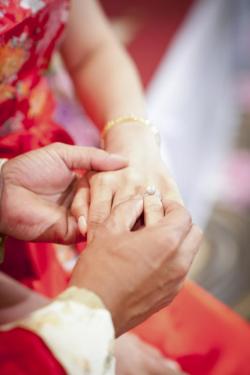
Despite the risks involved, this type of marriage business is still a popular source of income for many Lao women. Pui, a 27-year-old woman from Vientiane, found herself interested in the business. She wasn't as interested in finding a husband as she was in making money.
She visited the matchmaking agency and underwent the same process as Ms Nam. When the agency contacted her with a match, she went to go meet the man. When she arrived, she found 18 other good-looking Lao women in the office, all there for the same reason.
Ms Pui's matchmaking agent was a South Korean woman. She promised Ms Pui that she had found her a great suitor, but she had to come back to meet him after 10pm.
Getting cold feet, Ms Pui decided to back out.
Once she got home, she talked to Ms Nam, who she had met earlier at the office, about her experience via Facebook.
Ms Nam sent the picture of her "match" and it turned out it was the same man they had offered to Ms Pui.
Her suspicion growing, Ms Pui asked around about the service. She spoke to many women, including one who had agreed to go to China. She told Ms Pui that the man she met in Laos was different to the one who she was married off to in China, who turned out to be disabled and unable to walk.
Spectrum went to the shopping mall mentioned by both Ms Nam and Ms Pui, but the business appeared to have shut down. The agent's Facebook profile had also been removed.
"This whole thing is dodgy," Ms Pui said. "Now the Lao police are getting more serious about the problem. They have begun to raid this type of business in Vientiane over the past six months. I will contact the police if I find any similar type of business again."
Spectrum visited some places known by locals as hangouts for Chinese sex tourists. One hotel in central Vientiane was said to have many Lao women available for Chinese men for a night. But the venue was quiet, perhaps due to the ongoing raids.

Bets are off: The Jingland Hotel, the former entrance to a casino, in Boten, Laos. Boten was once a booming casino town where girls were trafficked. PHOTO: © 2016 THE NEW YORK TIMES
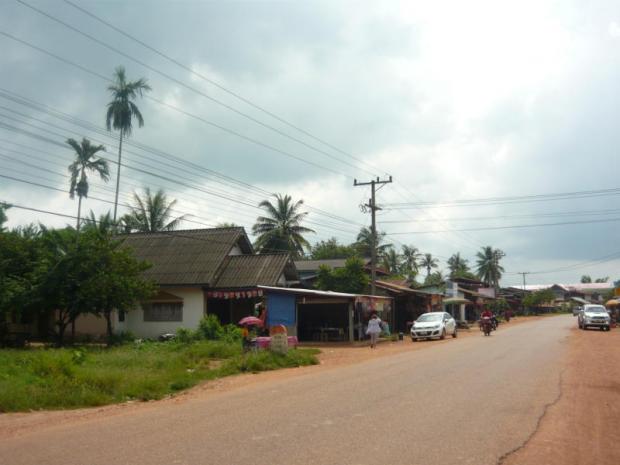
The end of the road: The way to Muang Fuang, where Anong, a 15-year-old girl, met and was sold off by a matchmaking agent, left. Anong's family house, right, where they farm potatoes.
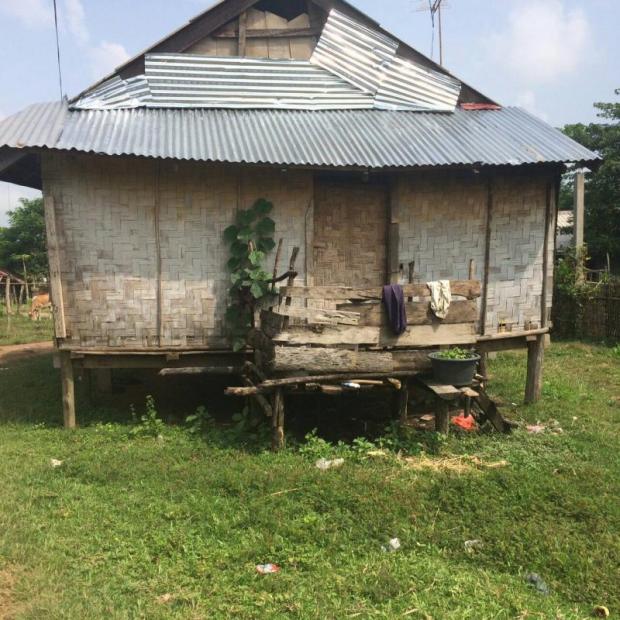
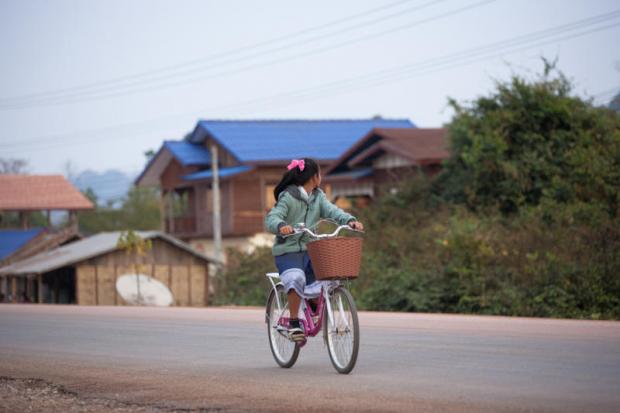
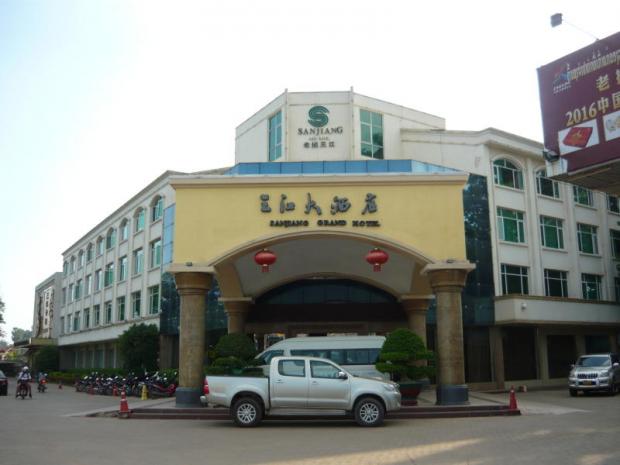
Down the aisle: The hotel where the matchmaking service's weddings usually take place. The police eventually raided the hotel, part of a crackdown on illegal businesses across Vientiane. photos: CHAIYOT YONGCHAROENCHAI
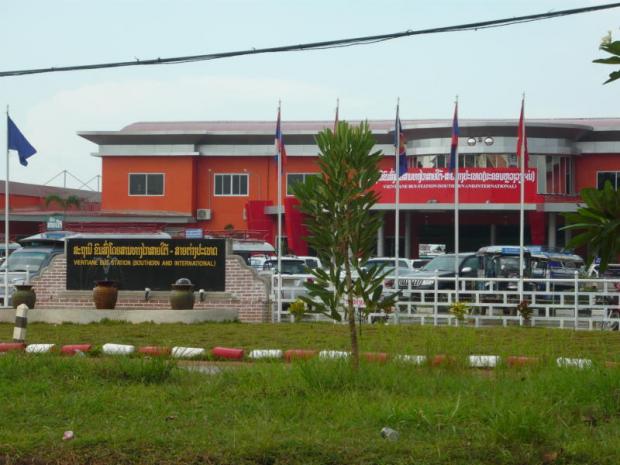
On the move: Lao girls picked up by the matchmaking agency were often taken by bus to meet their husbands-to-be in the target countries, including China and Thailand. photos: CHAIYOT YONGCHAROENCHAI